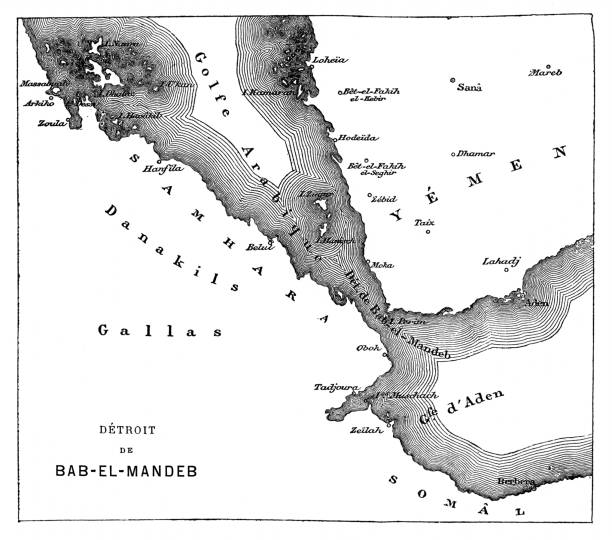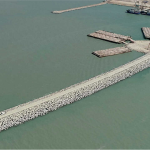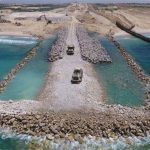Abstract
This paper investigates Israel’s vision of water security in the context of the southern Red Sea and Bab el-Mandeb Strait, highlighting the region’s strategic importance amid growing military presence from major powers, particularly the United States. It underscores the vital role of the Bab el-Mandeb as a key maritime passage, with over 3.3 million barrels of oil transiting daily, constituting 4% of global oil demand. The paper explores the geopolitical dynamics involving regional actors like Saudi Arabia, Iran, and the UAE, emphasizing the impact of Houthi attacks on maritime traffic, which have escalated tensions and disrupted vital shipping routes. The paper advocates for a coordinated international strategy to enhance maritime security, stabilize the region, and safeguard global trade interests. By fostering collaboration among stakeholders, the proposed framework aims to mitigate risks and promote a secure maritime environment in this critical area.
Key Themes
- Strategic Importance of Bab el-Mandeb
- Israeli Water Security Vision
- Geopolitical Dynamics
- Impact of Houthi Attacks
- Call for a Coordinated International Response
- Future of Regional Conflicts
- Recommendations for Stability
Bab el-Mandab: Strategic Importance and Israeli Vision
The Bab el-Mandeb Strait is one of the most important international waterways due to its significance in the Red Sea and its strategic geographical location forming the territorial waters of Asian and African countries (Yemen, Djibouti, Eritrea). This has made it a priority for major countries and their colonial ambitions to connect the eastern and western sides of the world. The volume of international trade and oil transport passing through the strait is substantial. Trade between the European Union and countries like China, Japan, India, and the rest of Asia relies on this passage. Additionally, the Bab el-Mandeb Strait is a crucial route for over 30 percent of global oil traffic, particularly from the Arabian Gulf and Iran. Its importance grew after the opening of the Suez Canal in 1869 and the discovery of vast oil reserves in the Arabian Peninsula.[1]
Ranked third in the world after the Straits of Malacca and Hormuz, the Bab el-Mandeb Strait sees three million and three hundred thousand barrels of oil passing through it daily, accounting for 4 percent of the global oil demand. Furthermore, commercial shipments passing through the strait make up 10 percent of global commercial shipments. The military significance of the strait was recognized by Israel during the 1967 and October 1973 wars. In 1967, Israel requested Britain to station military forces on Perim Island to control the Bab el-Mandeb Strait. During the October 1973 war, a Yemeni-Egyptian alliance closed the strait to Israeli navigation, cutting off the transport of oil from Iran to the port of Eilat and its connections to East and South Africa and Southeast Asia, resulting in significant economic damage for Israel.[2]
Regional and International Competition in Bab el-Mandab and the Gulf of Aden
The strategic importance of Bab el-Mandab extends through the 100 Yemeni islands, with Perim Island being the most significant. Positioned between the eastern and western passages of Bab el-Mandab, it is considered one of the world’s most crucial waterways. Connecting the ancient continents of Asia, Africa, and Europe, it has attracted unprecedented movements for the establishment of military bases along the Red Sea coasts.[3]
The port of Aden plays a vital role in the Chinese “Belt and Road Initiative,” provided that the necessary conditions are met. Regional competitors in the maritime transport industry, such as the ports of Jebel Ali (UAE), Duqm and Salalah (Oman), Gwadar (Pakistan), and Djibouti, are all vying for prominence in this strategic region. Aden serves as a focal point for many of the country’s strategic interests, including Aden International Airport, the free zone (container port), and the Aden Refinery Company. With an annual production capacity of about 8 million tons, the refinery exports processed oil to various markets.[4]
The war in Yemen has exposed the ambitions of regional powers in Bab el-Mandab and the Gulf of Aden. Saudi Arabia, Iran, and the Emirates have all demonstrated their interests in the region, with each pursuing its own goals through various means. The UAE, for example, has invested in oil stations near Djibouti and established military bases in Eritrea and Somaliland. Saudi Arabia, on the other hand, has contributed to the development of the new port of Tadjoura in Djibouti and signed agreements to establish military bases in the region.[5]
Beginning in 2018, the UAE shifted its strategy to control Yemen’s coasts and shipping lanes, leading to tensions within the anti-Houthi coalition. Saudi Arabia now finds itself facing the Houthis alone on its borders. Other countries, such as Turkey and Israel, have also become involved in the regional competition, recognizing the strategic importance of the area.[6]
Israel, in particular, has heightened its naval presence in the Red Sea, aligning itself with the US, UAE, and Bahrain in naval maneuvers. By securing the Bab el-Mandab Strait, Israel aims to protect its imports and exports to and from Asia, making it a matter of national security. Israel’s cooperation with the US Central Command and its decision to intensify ties with the US Fifth Fleet demonstrates its commitment to securing its interests in the Middle East and maritime zones. The evolving dynamics in the region highlight the complex web of regional and international competition in Bab el-Mandab and the Gulf of Aden.[7]
The outbreak of the war in Gaza activated Iranian allies “Axis of Resistance,” in the region to target both Israel and the USA. When the Yemen Houthi launched attacks on Israel with long-range cruise and ballistic missiles, and drones, relatively successful on ships passing through Bab el-Mandab and taking the Red Sea route.[8]
This situation resulted in severe disruptions in delivery chains, increased shipping insurance costs, and the need to take longer routes by circumnavigating Africa.[9] Despite multiple precise US airstrikes on Houthi missile storage, they were unable to halt the attacks. The EU decided to launch its Naval Force (EUNAVFOR) OPERATION ASPIDES, a defensive maritime security operation under the EU Common Security and Defence Policy (CSDP). This mission aims to protect cargo ships in the Red Sea from attacks by Yemen’s Houthi rebels. The Red Sea and Bab el-Mandab transit routes are among the most important globally, with approximately 20% of global container traffic passing through them, representing 40% of trade between Asia and Europe. These routes are particularly critical for the energy sector, as nearly 8% of liquefied natural gas and 10% of seaborne oil pass through them. Houthi attacks have already led to a 40% decrease in trade passing through the Red Sea and a 300% increase in shipping costs.[10]
Anticipating the closure of the Bab el-Mandab Strait by Iran and its proxies in response to the Gaza war, the US Navy’s Fifth Fleet announced in October 2023 the arrival of over three thousand American sailors and soldiers to the Middle East. The amphibious assault ship “USS Bataan” and the landing ship “USS Carter Hall” entered the Red Sea via the Suez Canal. The fleet’s area of operations includes the Arabian Gulf, the Gulf of Oman, the Red Sea, parts of the Indian Ocean, and three critical points in the Strait of Hormuz, the Suez Canal, and the Bab el-Mandab Strait.[11]
Benjamin Netanyahu emphasized that “what is happening in the Red Sea poses a threat to navigation worldwide, and Israel is fighting a war against Iran, which threatens to close the sea lane”.[12]
The ship traffic through the Red Sea, the trade artery between Asia and Europe, has declined by 80% since tensions between the Houthi and Israel escalated significantly in 2024. Israel launched airstrikes that hit “Houthi targets” in the west of the country, a day after the Yemenis claimed responsibility for a drone attack that killed one person in Tel Aviv. The Israeli airstrikes killed six people and wounded up to 80 others in Hodeidah.[13]
Since last November, the Houthis have launched attacks targeting maritime navigation in the Red Sea, citing opposition to Israeli military operations in Gaza. These attacks have forced international shipping companies to reroute their ships through the South African Passage of Good Hope to avoid the Red Sea. The Houthis have assured China and Russia that their ships can sail through the Red Sea and the Gulf of Aden without being attacked. The UK Maritime Trade Operations reported on Saturday, July 20, that they had received a report of two attacks on a ship 64 nautical miles northwest of Mokha, Yemen, causing minor damage.[14]
Conclusions
The rapid political, military, and security developments in the Arab region continue to raise fears and concerns about the future, especially with Israel’s escalation in the Bab el-Mandab Strait and its connection to the conflict with Gaza.
The United States has established a new military alliance in the southern Red Sea, hinting at a potential escalation in the region through military bases and alliances with China and Russia. This raises the possibility of armed conflicts and territorial disputes as different powers seek to control and influence in the Bab el-Mandab Strait. Israel is at the forefront of these developments, engaging in a comprehensive war with Gaza while aiming to secure its interests through the Bab el-Mandab Strait. The country, supported by major allies like the United States, is focused on protecting its security.
Recommendations
- Given the challenges of controlling the Bab el-Mandab Strait, Operation Guardian of Prosperity and the European Union’s naval operation aim to prevent further attacks. However, a new plan involving negotiation with the EU, US, and Israel is necessary. It is unrealistic to eliminate the Houthis and Iran, especially considering Israel’s recent military engagements.
- Addressing the conflict in Yemen requires a careful approach. Full-scale war could have dire economic consequences for Saudi Arabia, potentially drawing the US and Iran into the conflict.
- Designating the Houthis as terrorists is not a solution. Without a political resolution in Yemen from the US and Israel, the humanitarian crisis will worsen, making peace impossible.
- Stability in the Arab region hinges on peaceful resolutions to the conflicts in Palestine and Yemen. The European Union must take a unified stance on Israel’s actions and pressure the country to agree to a permanent ceasefire.
References
[1] Metcalfe, Tom. “Why the ‘bab El Mandeb’ Plays an Outsized Role in Human History.” History, January 12, 2024. https://www.nationalgeographic.com/history/article/bab-al-mandan-red-sea-suez-shipping-crisis-houthis-gaza.
[2] K P, Adhithyan. “Djibouti: A Strategic Choke Point in the Bab El-Mandeb Region.” Electronic Journal of Social and Strategic Studies 05, no. 02 (2024): 283–94. https://doi.org/10.47362/ejsss.2024.5211.
[3] Mussid, Fouad. “Israel’s Militarization of Bab al-Mandab.” Abaad Studies & Research Center, June 6, 2024. https://abaadstudies.org/en/strategies/topic/60091.
[4] Mussid, Fouad. “Regional and International Powers in Bab Al-Mandab and the Gulf of Aden: Between Competition and Conflict.” Abaad Studies & Research Center, August 31, 2023. https://abaadstudies.org/en/strategies/topic/59970.
[5] Mussid, Fouad. “Israel’s Militarization of Bab al-Mandab.” Abaad Studies & Research Center, June 6, 2024. https://abaadstudies.org/en/strategies/topic/60091.
[6] France 24. “Israel Threatens Tehran with an International Military Alliance If Bab Al-Mandab Is Closed.” France 24, August 2, 2018. http://tinyurl.com/yockq9pt.
[7] Mussid, Fouad. “Israel’s Militarization of Bab al-Mandab.” Abaad Studies & Research Center, June 6, 2024. https://abaadstudies.org/en/strategies/topic/60091.
[8] Dennard, Haydee, Bela Koshy, Ana Martín Gil, Kristian Coates Ulrichsen, and Jim Krane. “Blowback from Gaza: Geopolitics of the Houthi Red Sea Campaign.” Baker Institute, August 28, 2024. https://www.bakerinstitute.org/research/blowback-gaza-geopolitics-houthi-red-sea-campaign.
[9] Kuoman, Andrea. “Red Sea on Edge: Houthi Attacks Disrupt Vital Shipping Routes.” Global Affairs and Strategic Studies, February 16, 2024. https://www.unav.edu/web/global-affairs/red-sea-on-edge-houthi-attacks-disrupt-vital-shipping-routes.
[10] Barlucchi, Piero. “From Atalanta to Aspides: Old and New Challenges for EU Maritime Operations.” IAI Istituto Affari Internazionali, March 20, 2024. https://www.iai.it/en/pubblicazioni/atalanta-aspides-old-and-new-challenges-eu-maritime-operations.
[11] skynews Arabia. “Deterrence or Prolongation of Attacks.. What Does the Formation of the European Union’s ‘Aspedes Mission’ Mean?” skynews Arabia, December 31, 1969. https://www.skynewsarabia.com/middle-east/1694351-%D9%85%D9%87%D9%85%D8%A9-%D8%A7%D9%94%D8%B3%D8%A8%D9%8A%D8%AF%D8%B3-%D8%AA%D8%B1%D8%AF%D8%B9-%D9%87%D8%AC%D9%85%D8%A7%D8%AA-%D8%A7%D9%84%D8%AD%D9%88%D8%AB%D9%8A%D9%8A%D9%86-%D8%A8%D8%A7%D9%84%D8%A8%D8%AD%D8%B1-%D8%A7%D9%84%D8%A7%D9%94%D8%AD%D9%85%D8%B1%D8%9F.
[12] Mussid, Fouad. “Israel’s Militarization of Bab al-Mandab.” Abaad Studies & Research Center, June 6, 2024. https://abaadstudies.org/en/strategies/topic/60091.
[13] Martin, Nik. “Israel, the Houthis and the Worsening Navigation Crisis in the Red Sea.” dw.com, July 27, 2024. https://www.dw.com/ar/%D8%A7%D9%84%D9%85%D9%88%D8%A7%D8%AC%D9%87%D8%A9-%D8%A8%D9%8A%D9%86-%D8%A5%D8%B3%D8%B1%D8%A7%D8%A6%D9%8A%D9%84-%D9%88%D8%A7%D9%84%D8%AD%D9%88%D8%AB%D9%8A%D9%8A%D9%86-%D8%A3%D8%B2%D9%85%D8%A9-%D8%A7%D9%84%D9%85%D9%84%D8%A7%D8%AD%D8%A9-%D8%AA%D8%AA%D9%82%D8%A7%D9%82%D9%85-%D9%81%D9%8A-%D8%A7%D9%84%D8%A8%D8%AD%D8%B1-%D8%A7%D9%84%D8%A3%D8%AD%D9%85%D8%B1/a-69766232.
[14] Dennard, Haydee, Bela Koshy, Ana Martín Gil, Kristian Coates Ulrichsen, and Jim Krane. “Blowback from Gaza: Geopolitics of the Houthi Red Sea Campaign.” Baker Institute, August 28, 2024. https://www.bakerinstitute.org/research/blowback-gaza-geopolitics-houthi-red-sea-campaign.





Dominique3541
Very good https://shorturl.at/2breu
Shannon583
Good https://lc.cx/xjXBQT
Nigel4941
Good https://is.gd/N1ikS2
Jamie2177
Very good partnership https://shorturl.fm/68Y8V
Tiffany2976
https://shorturl.fm/6539m
Madeline59
https://shorturl.fm/a0B2m
Mason933
https://shorturl.fm/9fnIC
Esme4414
https://shorturl.fm/j3kEj
Annette3734
https://shorturl.fm/A5ni8
Alexandra2581
https://shorturl.fm/fSv4z
Ethan4178
https://shorturl.fm/nqe5E
Catherine1957
https://shorturl.fm/hQjgP